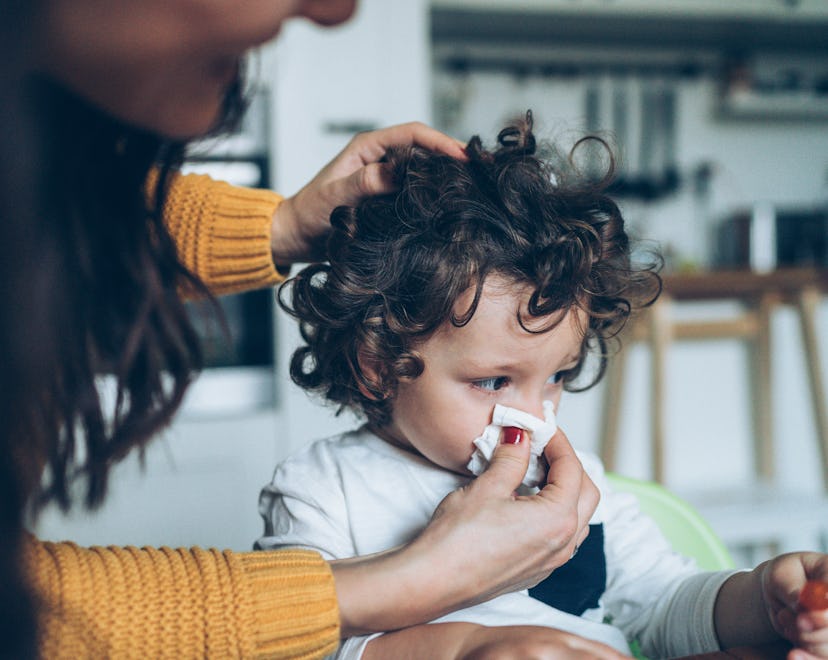RSV

Do Babies With RSV Sleep More? Pediatricians Explain
It’s all about keeping them comfortable.
As many parents are all too aware, respiratory syncytial virus (RSV) is a highly contagious virus that causes illnesses of the nose, throat, and lungs, and most kids get it at least once in the first two years of life. Most kids will have been infected with RSV by the time they are two years old, so if your baby has RSV right now, just know that it’s incredibly common and pretty unavoidable in those early years. Nonetheless, it can be nerve-wracking. How will RSV affect your little one? Do babies with RSV sleep more, for example?
What is RSV?
RSV is very common and is easily spread from person to person. “RSV affects children two and under more than older children, and tends to be more severe the younger the infant, most particularly those infants under two months,” Dr. Alyssa Silver, a pediatrician, tells Romper. The virus also more severely affects “premature babies [and babies with] any medical preconditions like congenital heart disease [or] bronchodysplasia” according to Dr. Ricardo G. Baler. While the virus is harder on smaller children, Dr. Matthew Kelly says adults and older children can still get infected with RSV but are less symptomatic because “it comes down to the size of the airways.” As babies get older, Dr. Kelly explains, their airways get larger, which makes the virus easier to manage (but does not make it less contagious).
Why is my baby with RSV sleeping more?
Like with any illness, a baby’s body has to work hard to fight off RSV, which may make them a little more sleepy than usual. Because of the nature of the virus, they won't sleep quite as soundly. Dr. Baler says babies infected with RSV “will have some difficulties in falling asleep,” and Dr. Silver notes that “infants may wake more often” once they do fall asleep. Dr. Kelly explains that “young infants breathe primarily through their noses and RSV causes a runny/congested nose,” so they wake more frequently because they're working harder to breathe.
Of course, there are always exceptions. “Some [babies] will sleep longer, but the majority don't sleep well or as long” with RSV, says Kelly. It's perfectly safe (and healthy) for a baby to sleep off the virus, but parents should take notice if the baby isn't waking to eat, as this is something that needs to be assessed by a health care professional. “Severe sleepiness to the point where the baby isn't waking up to feed can be a sign that the infant is starting to tire” from working so hard to breathe, Dr. Kelly warns. So, call your pediatrician's office if you're concerned.
How can I help my baby with RSV get better?
Unfortunately, there isn't much that can be done to speed up the healing process; RSV just has to run its course. The best thing parents can do to encourage restful sleep is to help their baby be as comfortable as possible. Dr. Kelly recommends putting a few drops of saline in the baby's nose and clearing the congestion out with a syringe. (However, he notes that this should be done within reason, and not “excessively.”) Dr. Silver recommends putting a humidifier in Baby’s room to offset the dry heat. Dr. Baler recommends “treat[ing] a fever with acetaminophen (Tylenol), if needed.”
If your baby has been diagnosed with RSV, don't panic, because “almost every child will have been infected [with the virus] by their second birthday,” reminds Kelly. It can be scary to hear your baby wheezing, and you should call the pediatrician if you need some reassurance or are worried that your baby is struggling to breathe.
Experts:
Ricardo G. Baler, M.D., FAAP, UNC Pediatrics
Matthew Kelly, M.D., MPH, Assistant Professor of Pediatrics and Global Health at Duke University
Alyssa Silver, M.D., Pediatrician at the Children's Hospital at Montefiore
This article was originally published on